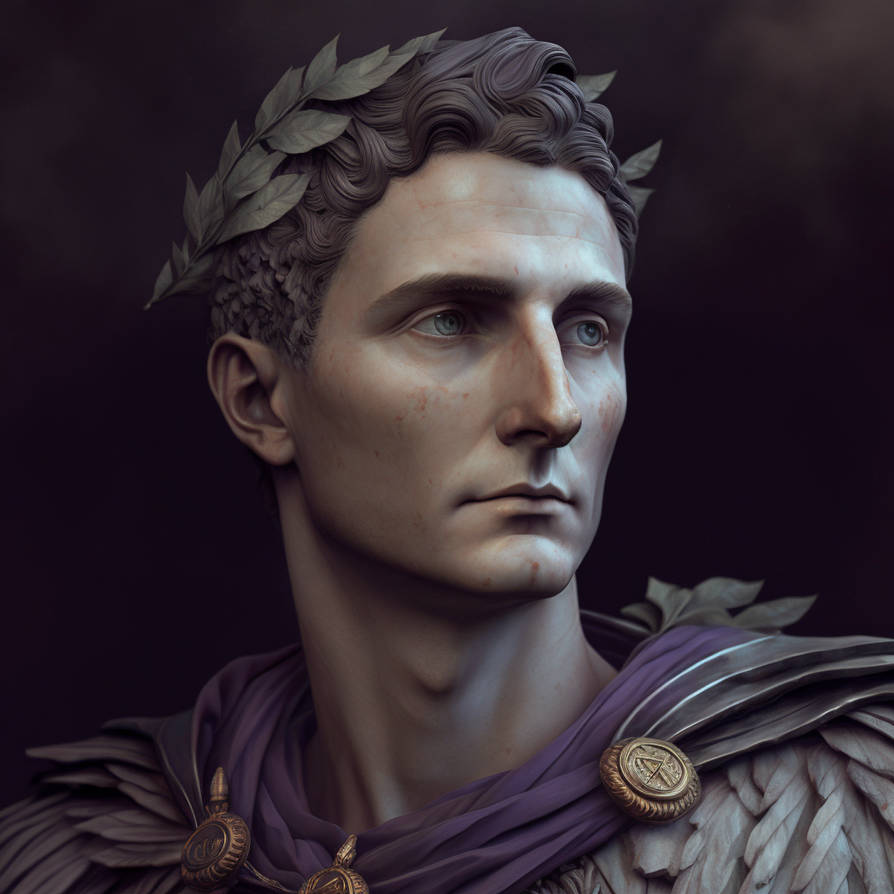BIOGRAPHY:
Gaius Julius Caesar Octavian Augustus is a Roman politician who lived and worked in the historical period from 63 BC to 14 AD. Octavian Augustus was an ancient Roman politician and founder of the Roman Empire. Octavian Augustus held the position of consul 13 times, from 12 BC he became the great pontiff, from 23 BC Octavian Augustus held the powers of a tribune. In 2 BC, Octavian Augustus was awarded the title “Father of the Fatherland.”
Gaius Julius Caesar Octavian Augustus was the first emperor of Ancient Rome. None of his successors could compare with Octavian Augustus in wisdom and cunning. No one subsequently managed to maintain power over a huge power for half a century. No one managed to leave such a long memory of themselves. On the other hand, Octavian Augustus caused a lot of contradictory opinions and disputes among his contemporaries and descendants. Some were convinced that Octavian Augustus was a model, others – a fiend of evil, and others – a mystery.
In his life, Octavian Augustus played many roles, since he was also an actor in the ancient theater. Octavian Augustus performed each time under a new name and under a new mask. Octavian Augustus entered the “stage” at an early age and did not leave it until his death.
Augustus as a child:

The childhood of Emperor Gaius Julius Caesar Octavian Augustus
Gaius Julius Caesar Octavian Augustus was born on September 23, 63 BC in Rome in the family of the humble but wealthy and respected senator Gaius Octavius and his wife, the niece of Julius Caesar. At the age of four, Octavian Augustus was left without a father, so his grandmother raised him. After the death of his grandmother, Octavian Augustus again found himself in the care of a tender and caring mother. Octavian Augustus grew up to be an obedient, modest, and thoughtful young man beyond his years. He loved to study and comprehend new horizons of knowledge and therefore achieved success in this field. He spent his free time in the company of respectable older relatives. However, Gaius Julius Caesar Octavian Augustus was in poor health. Constant ailments prevented Gaius Julius Caesar from Octavian Augustus from completing his education properly – by serving in the army of the invincible Caesar.
But despite his poor health, Gaius Julius Caesar Octavian Augustus takes part in the triumph of the great commander and receives military awards on a par with the bravest warriors. Caesar, who by that time had become the sole ruler, tried in various ways to support his great-nephew. Caesar did not have his own children and therefore the dictator considered Gaius Julius Caesar Octavian Augustus to be the future successor of his family and his cause. Caesar takes Gaius Julius Caesar Octavian Augustus to war with Parthia, whose troops raided the eastern provinces of the Roman Empire and devastated them. Caesar sends Gaius Julius Caesar Octavian Augustus to the Greek city of Apollonia, where the gathering of all fighting forces is announced. There, Gaius Julius Caesar Octavian Augustus learns of the murder of Caesar by conspirators led by Brutus and Cassius. Caesar in his will declares Gaius Julius Caesar Octavian Augustus his adopted son and therefore he is the heir.
Octavian Augustus declares himself heir to Julius Caesar:

The main ally of Gaius Julius Caesar Octavian Augustus after the death of Caesar was Mark Antony. Mark Antony was one of the talented military leaders, skillful demagogues and successful adventurers. The talented personality of Mark Antony was comparable to the personality of the murdered Caesar. Gaius Julius Caesar Octavian Augustus turned to Anthony with a respectful request – to return the huge sum of money he had seized in Caesar’s house and to help take revenge on his murderers. However, on the part of Mark Antony, Gaius Julius Caesar Octavian Augustus received a decisive refusal. Under pressure from Mark Antony, the national assembly does not approve the fact of the adoption of Gaius Julius Caesar by Octavian Augustus. People offended and disadvantaged by Caesar filed lawsuits against his heir, demanding compensation for the damage caused. Gaius Julius Caesar Octavian Augustus loses all his trials. A large inheritance was dissolving before our eyes, and debt obligations were quickly and inevitably growing. Mark Antony withdraws the cash, and his land holdings have been lost in lost court cases.
Then Gaius Julius Caesar Octavian Augustus sells his own estates and pays off the main one of his debts. Gaius Julius Caesar Octavian Augustus, in accordance with Caesar’s will, issues 300 sesterces to each metropolitan plebeian and gifts even more generously to veterans. After committing this act, Gaius Julius Caesar Octavian Augustus was on the verge of poverty and poverty, but at the same time being at the peak of popularity among all Roman aristocrats. In any place of Gaius Julius Caesar Octavian Augustus, the crowd greeted him with ovations, and the veterans with oaths of allegiance. Everyone unanimously called him a worthy heir to the great Caesar.
Mark Antony, who was appointed governor of Cisalpine Gaul, bypassing the law, gathers an army from Caesar’s veterans in order to establish himself in this province, located several marches from Rome. Guy Julius Caesar Octavian Augustus also convenes an army of veterans loyal to him. The Senate, which has no armed forces of its own, decides to choose the lesser of two evils. He gives Gaius Julius Caesar Octavian Augustus the powers of a commander and declares Mark Antony an enemy of the fatherland. Not far from the city of Mutina, which is the capital of the province, Caesar’s veterans enter into battle with each other for the first time. Gaius Julius Caesar Octavian Augustus, as an ordinary legionnaire, valiantly fights side by side with his soldiers. After the death of the standard-bearer, Gaius Julius Caesar Octavian Augustus picks up the falling banner and carries it himself to the attack. This act, which was committed by Gaius Julius Caesar Octavian Augustus, was similar in nature to the heroic act committed by Caesar in his first and last battles. The army of Mark Antony was defeated and was forced to retreat beyond the Alps, where they united with the army of Aemilius Lepidus, who was a prominent comrade-in-arms of Julius Caesar.
The Senate confirms the adoption of Augustus by Caesar:
Gaius Julius Caesar Octavian Augustus constantly demands from the Senate the rewards they promised for his soldiers, and for himself the highest post of consul in the state. The senators, who counted on the huge army assembled by Brutus and Cassius in the eastern provinces, did not reckon with the 19-year-old Gaius Julius Caesar Octavian Augustus. Active representatives of the Senate said that it was time for Gaius Julius Caesar Octavian Augustus to be elevated to heaven for his services to the fatherland, but they themselves had no idea how soon they themselves would have to find themselves there.
Following the example set by Caesar, Gaius Julius Caesar Octavian Augustus suddenly maneuvers his legion towards Rome and captures the great city. At the same hour, the Senate and the People’s Assembly fulfill all the demands of the winner and confirm to Gaius Julius Caesar Octavian Augustus the fact of Caesar’s adoption. Gaius Julius Caesar Octavian Augustus is ranked among the Julius family, which traced its origins to the goddess Venus, and already officially receives a new name Gaius Julius Caesar Octavian and a new father. Revenge for his father became his sacred duty.
Octavian Augustus makes peace with Antony:
![]()
After the capture of Rome, Gaius Julius Caesar Octavian Augustus entered into an agreement with Mark Antony and Lepidus, based on the nature of which it was called the second triumvirate. The triumvirs solemnly declare the late Caesar a god and proclaim as their pursued goal – revenge on his murderers and sacrileges. They put up for public viewing lists with the names of the conspirators who killed Caesar and those who supported them. All these people were subject to execution and their property to confiscation. The lists also included the names of personal enemies of the triumvirs and simply rich people whose property could be profited from.
An unprecedented bacchanalia of murders and robberies broke out in Rome and throughout Italy; the Triumvirs and their entourage became fabulously rich. Meanwhile, the legions of Bruga and Cassius went on the offensive. Near the Greek city of Philippi, Mark Antony and Gaius Julius Caesar Octavian Augustus give battle to representatives of republican views on the structure of Rome. The ill Gaius Julius Caesar Octavian Augustus commanded sluggishly and unsuccessfully, but Mark Antony shows miracles of courage and resourcefulness. After two fierce battles, the army of Brutus and Cassius was defeated, and they themselves committed suicide. Then the remaining 60 conspirators were killed. A little later, in memory of the debt fulfilled, Gaius Julius Caesar Octavian Augustus erects a temple to Mars the Avenger in the center of Rome. Lepidus soon loses any influence, and the entire Roman state finds itself under the rule of Gaius Julius Caesar, Octavian Augustus and Mark Antony. Gaius Julius Caesar Octavian Augustus and Mark Antony reached an agreement to divide territory, soldiers and responsibilities in equal shares. Mark Antony began to own the rich eastern provinces and he became the commander in the war with Parthia, which, in case of victory, promised enormous glory and booty, Gaius Julius Caesar Octavian Augustus began to own the backward western provinces, devastated Italy and he was faced with the unenviable task of finding land and money for insatiable veterans.
Octavian Augustus turns from avenger to tyrant:
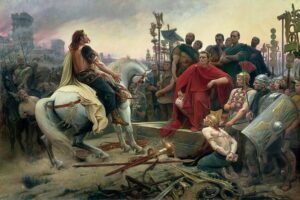
A few years after the Battle of Philippi, Italy resembles a country that has been captured by a foreign army. In order to accommodate the veterans, land was taken away from 16 of the richest cities, and the remaining cities were subject to enormous taxes and taxes. Roads become impassable due to banditry, sea routes due to piracy. Bandits and pirates are mainly people who are deprived of civil rights and livelihoods, victims of proscriptions and confiscations. Hunger and poverty reign everywhere. Desperate people raise uprisings, which are suppressed with unprecedented ferocity. After committing an act of reprisal against the murderers of Caesar, Gaius Julius Caesar Octavian Augustus, in the eyes of the majority of his fellow citizens, becomes not a noble avenger, but a vile tyrant. There are rumors everywhere about torture and executions, which are carried out on the orders of Gaius Julius Caesar Octavian Augustus or by him personally, about the crazy night orgies of the descendant of Venus, accompanied by outrages against the gods and sacred rites.
Guy Julius Caesar Octavian Augustus is constantly haunted by a feeling of fear of conspiracies and uprisings, which pushed him to new cruelties. Only soldiers protected Guy Julius Caesar Octavian Augustus from universal hatred. But these were dangerous and unreliable defenders. Several times Gaius Julius Caesar Octavian Augustus himself almost became a victim of riots and riots. Like other rulers, Gaius Julius Caesar Octavian Augustus is convinced from his own experience that the truth is true – bayonets are good for many things, but sitting on them is completely uncomfortable.
The old role has already exhausted itself. Gaius Julius Caesar Octavian Augustus understands this. Gaius Julius Caesar Octavian Augustus, after rewarding the veterans and suppressing the uprising, Gaius Julius Caesar Octavian Augustus appears under a new name and in a new role.
Octavian Augustus – Defender of the Fatherland:
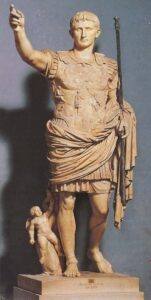
Gaius Julius Caesar Octavian Augustus stops the process of mass executions and confiscations, forgives debts and arrears, limits the violence of the military, eradicates robbery and piracy. Gaius Julius Caesar Octavian Augustus publicly announces that after the return of Mark Antony from the East, both rulers will relinquish power and restore the previous political system. Attitudes towards him began to change for the better. The poets, who were patronized and cherished by Augustus’s close friend Maecenas, sing of the kindness and generosity of the young Caesar. They predict the imminent arrival of a golden age.
Gaius Julius Caesar Octavian Augustus regains popularity after winning a long and difficult war with Sextus Pompey, the son of Pompey the Great, Caesar’s main rival. As commander of the fleet, Sextus Pompey captured the island of Sicily, put fugitive slaves on the oars of his ships and severed all ties between Italy and the overseas provinces. Thus, Sextus Pompey deprives Rome of the grain coming from there. Having defeated the pirate power of Pompey, Gaius Julius Caesar Octavian Augustus returned the distribution of free bread to the Roman poor, and the slaves who had fled from them to the rich. Everyone praised him and called him the defender of the fatherland.
Octavian Augustus declares war on Cleopatra:

Meanwhile, the glory of Mark Antony faded. Military operations with Parthia under the command of Mark Antony ended in failure. Mark Antony married the Egyptian queen Cleopatra, Caesar’s former lover, hated by all of Rome. Mark Antony lived in royal luxury, indulged in endless feasts and amusements and gradually turned from a stern Roman commander into a pampered oriental despot. To the indignation of many Romans, Mark Antony bequeaths Roman possessions in the East to Cleopatra and proclaims her “Queen of Kings.”
Gaius Julius Caesar Octavian Augustus declares war on Cleopatra and then all of Italy swears allegiance to him as the defender of the fatherland and paternal shrines from the foreign threat. At Cape Actium, the famous admiral and best friend of Gaius Julius Caesar Octavian Augustus Vipsanius Agrippa defeats the fleet of Mark Antony and Cleopatra. Mark Antony and Cleopatra flee to Egypt, and then, in order not to be captured, commit suicide.
Octavian Augustus abdicates power:

The entire Roman state was subordinated to the power of Gaius Julius Caesar Octavian Augustus. Now Gaius Julius Caesar Octavian Augustus faced a difficult choice. He had to either fulfill his promises to renounce power, or again appear before everyone in the unenviable and deadly role of a tyrant. Gaius Julius Caesar Octavian Augustus once again finds a way out. At the same time, Gaius Julius Caesar Octavian Augustus proves himself not only to be a magnificent artist, but also an excellent director. For two years, Gaius Julius Caesar Octavian Augustus has been weaving behind-the-scenes intrigues and preparing a new comedy. And so, January 13, 27 BC. e. Gaius Julius Caesar Octavian Augustus appears in the Senate, “cleansed” of persons undesirable to him. There, Gaius Julius Caesar Octavian Augustus solemnly declares that he is transferring state powers to the disposal of the Senate and the Roman people.
Senators for a long time begged Gaius Julius Caesar Octavian Augustus to remain at the helm of the state, but he was adamant in his self-denial. Then the now all-powerful Senate ordered him, and, as a loyal citizen, Gaius Julius Caesar Octavian Augustus was forced to obey. However, he agreed only to postpone his resignation for ten years and until then to retain only some of his powers under the supreme authority of the Senate and the people. And Gaius Julius Caesar Octavian Augustus left behind him the command of the army, the administration of those provinces where the legions were stationed, the powers of the people’s tribune, who had immunity and the right to impose a ban on any decisions of any authorities, and the honorary title of princeps of the senate (that is, the first senator). The princeps was the first to express his opinion when discussing important state affairs.
As a reward for restoring the republic, the Senate gave him the honorary name Augustus (“sacred”) and swore, together with all citizens and subjects, to strictly carry out his every decision and order.
Ten years later, Gaius Julius Caesar Octavian Augustus was again “persuaded” to extend his term of office. Then this procedure was repeated several more times and became a custom. The successors of Gaius Julius Caesar, Octavian Augustus, also began their reign with a decisive renunciation of power and celebrated its renewal every ten years.
Political system in Rome under Octavian Augustus:
It still remains unknown what kind of political system was established in Rome under Gaius Julius Caesar Octavian Augustus. Was it a republic, a monarchy, or something else? In the restored republic everything was as before, but at the same time it seemed not quite the same.
As in the old days, the senate examined state issues and issued decrees, the people’s assembly elected magistrates, and they held court and gave orders. However, as everyone knew very well, the decisions of the Senate never disagreed with the opinion of Gaius Julius Caesar Octavian Augustus, and the popular assembly elected only those whom it recommended to the highest posts. And only so that they obediently carry out his will. Even the governors of the overseas provinces now had to rule with an eye on the princeps: from now on they only “sheared” their subjects, and did not “skin them.”
Nevertheless, few of the contemporaries of Gaius Julius Caesar Octavian Augustus thought that new and unprecedented orders were being established in Rome, that he had ceased to be himself. On the contrary, it seemed to many that, having put an end to the chaos and the collapse of bloody civil unrest, Princeps was able to revive the system of his ancestors in the state.
Indeed, in the decrees and laws adopted on the initiative of the Princeps, we were talking about the restoration of ancient temples and sacred rites, about strengthening in the spirit of the ancestors the holiness of family ties and the respect of the younger for the elder and the lower for the higher. And for important positions, the Princeps most often recommends those to whom they were previously intended – respectable, rich and noble people. Moreover, even those of them whose fathers once fought under the banners of Brutus and Cassius. And Augustus himself constantly repeated that he considered a good person only one who did not want any changes to the anciently established order.
Octavian Augustus in the assessment of writers and historians:

A man without shame, without faith and honor, crafty and ungrateful, stingy and bloodthirsty, calm in his crimes, in a state with a proper structure, would be sentenced to the highest punishment for his very first crimes. Currently, one can evaluate Augustus as an agile and happy monster.
A cold mind, an insensitive heart and a cowardly character forced him, when he was nineteen years old, to put on a mask of hypocrisy, which he subsequently never took off. His virtues, as well as his vices, were fake, and, in accordance with what his personal interests required, he was at first an enemy of the Roman world, and eventually became its father. He wanted to deceive the people with the ghosts of the civil system of government.
There are enough reasons to believe that Gaius Julius Caesar Octavian Augustus was guided by a very strong sense of duty, that he considered himself a soldier standing at a post from which it would be criminal to leave. In the sense in which Alexander, Caesar or Napoleon surpassed all people in their intellect, Augustus cannot be considered a genius. Nor was he: he was the man the world needed, and could justifiably be considered one of the greatest servants of the human race.
Gaius Julius Caesar Octavian Augustus was a born politician from head to toe, and as such he represents an exceptional, perhaps even the only phenomenon, at least in ancient history… The political genius of Gaius Julius Caesar Octavian Augustus is an almost terrifying phenomenon. Tactical calculation and strategic foresight are combined in it so naturally and so perfectly that often a pre-calculated action looks like an intuitively made decision, and what is clearly at first glance an intuitive action suddenly turns into a sober calculation. As a result, not a single major mistake, not a single blunder throughout his political career. This example in history is, in our opinion, completely unprecedented! But the bearer of these qualities was forced to pay for the loss of purely human qualities – the politician in him supplanted and destroyed the person; it was no longer a person, but an almost flawless political mechanism, a robot. As for the private, or “human” aspect of the image of Octavian, then, most likely, this is the image of an actor who continuously and tirelessly performs a certain role and becomes so engrossed in it that it has become life itself for him.
Family life of Emperor Octavian Augustus:
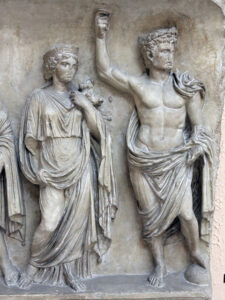
Every word, every gesture was verified and thoughtful. He carefully prepared all his speeches and, unlike other speakers of that era, read them “from a piece of paper.” Even with his wife Livia, he preferred to talk from pre-prepared notes, so as not to accidentally say more or less than necessary. Like all great artists, he understood perfectly well that one cannot rely only on talent and inspiration.
His last role turned out to be the most successful. The long years of his reign were rarely overshadowed by unrest and strife. Almost all of his undertakings ended successfully, and the subsequent rulers of the senators always wanted to be even happier than Gaius Julius Caesar Octavian Augustus. However, the gods do not fully gift anyone. The greater the favors given to their favorite, the heavier the retribution. Roman historians writing about Augustus unanimously pointed out: no matter how happy he was in public affairs, he was just as unhappy in personal ones.

His family life did not work out from the very beginning. He divorced his first wife, the adopted daughter of Mark Antony, almost immediately after the wedding, having quarreled with her stepfather. The second wife, a relative of Sextus Pompey, was a beautiful and noble lady, but she had, as Gaius Julius Caesar Octavian Augustus himself later complained more than once, an extremely bad temper.
She constantly reproached her young husband for his numerous lovers and finally alienated her by refusing to make friends with the most important of them, Livia. Tired of his wife’s grumpiness, Guy Julius Caesar Octavian Augustus divorced her on the very day she gave birth to his daughter Julia, his only child.
However, the marriage with Libya, free from political calculations, turned out to be the most successful of all. The couple lived for half a century in love and harmony. Livnya, who shone with both beauty and sharp intelligence (she was called “Odysseus in a woman’s dress”), did not interfere with her husband’s fleeting hobbies. On the contrary, she herself selected young beauties for him.
Children of Octavian Augustus:

Livia’s children from her first marriage, Drusus and Tiberius, were extremely obedient and well-behaved. But Julia, who grew up, as was customary in the good old days, in harsh simplicity and seclusion under the watchful supervision of her father and stepmother, nevertheless turned out to be just as ungrateful and quarrelsome as her mother. Julia did not want to be an exemplary daughter and wife, to sit at home, spin wool and devotedly love all those whom Augustus, for high reasons of state, intended to be her husbands. Her overly free behavior caused constant gossip. And when her third husband Tiberius, who had an undisguised disgust for her, finally left her and left Rome for many years, she, trampling on the sanctity of family ties, openly entered into a relationship with one of the sons of Mark Antony.
Having learned about this, Gaius Julius Caesar Octavian Augustus almost went crazy with anger and shame. At first he wanted to execute the criminal, but then he limited himself to exiling Julia to a distant rocky island. There, cut off from the whole world and surrounded by jailers and spies, she led a life full of unheard-of hardships and humiliations. Until her death, Julia did not repent of what she had done, and did not want to beg her father’s forgiveness.
Julia’s two eldest sons, whom Gaius Julius Caesar Octavian Augustus surrounded with the greatest love and care and wanted to make his successors, died almost simultaneously, in the prime of their youth. Her daughter Julia the Younger, also distinguished by her rebellion and willfulness, exactly repeated her mother’s fate.
Death of Octavian Augustus:
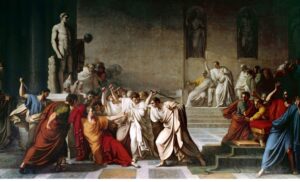
The closest friends of Gaius Julius Caesar Octavian Augustus – Agrippa and Maecenas – had long been in the grave by that time. Only faithful Libya remained the hope and support of the decrepit princeps. With her alone he had long, intimate conversations, notes of which were later discovered in the imperial archives by the Roman Historian Suetonius.
Due to the losses and illnesses suffered, Augustus in his last years was no longer as amiable and sociable as before, and only occasionally appeared in the forum and in the Senate. Once, when the Roman people were unable to elect worthy people to high positions, Augustus simply canceled the elections and appointed all the magistrates himself. Another time, when Ovid, the most brilliant and frivolous of all Roman poets, somehow angered Augustus, he exiled him to distant and wild lands. There the unfortunate favorite of the muses spent many years, in vain begging for forgiveness and trying to guess what his fault was.
When the gods finally called the elderly Augustus to themselves, many Romans, mourning their princeps, who “put out the fire of the civil war,” could not hide a sigh of relief. Oh, if they only knew what awaited them ahead!
Gaius Julius Caesar Octavian Augustus left behind a good legacy and bad heirs. The Roman Empire flourished. But in Rome itself only flatterers and informers prospered. The successors of Gaius Julius Caesar Octavian Augustus ruled according to the principle: let them hate – as long as they are afraid. They trampled all the laws, both divine and human, executed many people, but they themselves drowned in the blood they shed. The great-grandson of Augustus Caligula, to the rejoicing of all Rome, was stabbed to death by his own officers, the great-great-grandson of Gaius Julius Caesar Octavian Augustus Nero was overthrown and committed suicide. The dynasty founded by Augustus ended there.
Legacy of Octavian Augustus:

The new emperors, who belonged to the Flavian dynasty (69-96), and then the Antoninov (96-192), as well as Gaius Julius Caesar Octavian Augustus, tried to play the role of the first citizen. Those who did not want or were unable to behave accordingly most often faced a short reign and a painful death.
In the Roman Empire, unprecedented peace and quiet was established for two centuries, called the blessed “Peace of Augustus.” Its wealth gradually grew, its power grew stronger, its borders expanded and included new peoples. Villages turned into villages, and villages into cities. Fields and gardens arose in place of forests and swamps. Fierce warriors became sedate plowmen and passionate preachers. And from the seeds sown by both, the first sprouts of modern civilization emerged…
